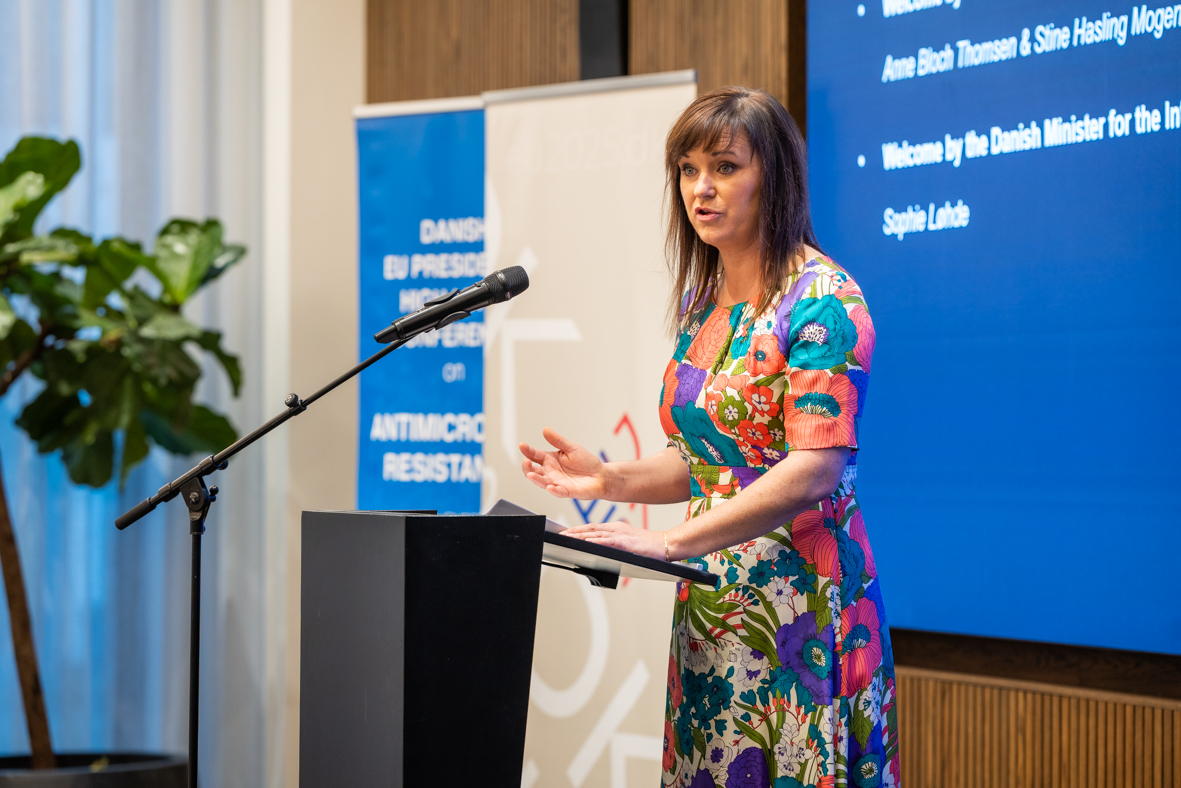21.11.2025
When Kristin Molven was diagnosed with lymphoma, her whole life was turned upside down. She went from being a doctor to becoming a patient. At one point the cancer spread to her central nervous system, leaving her paralyzed from the waist down.
Today, Kristin Molven is cancer free, but the illness has left its mark on the 36-year-old Norwegian.
And she is especially grateful for one thing: that we have antibiotics that can stop infections. “Antibiotics didn’t cure my cancer, but it was essential to my treatment,” she says.
She is one of the speakers at the EU conference on antimicrobial resistance, AMR, which is partly organised by the AMR Alliance, of which Pharmadanmark is cofounding.
The conference was part of the official programme of the Danish EU Presidency and took place over two days in November. The first day, held in Aarhus, focused on clinical issues, while the second day in Copenhagen focused on, how we politically should tackle AMR.
On day two of the conference, in a hall filled with leading politicians and experts from across Europe, Kristin Molven shares her story.
“I had chemotherapy and a stem cell transplant. The treatment didn’t just destroy the cancer cells, it also wiped out the white blood cells that are essential for the immune system. So, I had to take antibiotics every day to prevent infections,” she explains.
The AMR agenda is hugely important to her, because in the middle of her treatment she experienced the threat firsthand.
After her third round of chemotherapy, she developed a fever. The cause was neutropenic sepsis, a form of blood poisoning that occurs when the immune system is weakened. The first antibiotics she received didn’t work. The bacteria in her body were resistant.
Fortunately, the second type she was given did work, and the treatment could continue.
Today, Kristin Molven wants to use her story to draw attention to AMR. Without antibiotics, she and many other cancer patients would not have survived.
“We are constantly developing new cancer treatments, but if we don’t have effective antibiotics, we can’t use them safely on patients,” she says.
The silent pandemic
The purpose of the conference in Copenhagen is to increase political focus on AMR.
A new report from the WHO shows that one in six common bacterial infections in 2023 was caused by resistant bacteria, and it is clear that we need to work together across borders if we are going to beat this threat.
This is also one of the points made by the Danish minister of the interior and health, Sophie Løhde, when she takes the stage.
“AMR has been called the silent pandemic. But we need to speak loudly about AMR, and we need to act. It is urgent, because this is about saving lives and protecting our healthcare systems”.
The minister stresses that AMR is not a problem in the distant future but a very real threat right now.
“We tend to talk about AMR on a very technical level, and AMR almost sounds like some kind of IT system. But we need to remember one thing: this is about human lives”.
“Every year, 35,000 people die from AMR in the EU. That is one death every 15 minutes.”
Throughout the day, various experts, industry representatives and politicians share their perspectives.
The programme tackles the big questions: what can we do, which countries can we learn from, and what are the next steps?
There are several suggestions. The importance of vaccines and research is highlighted again and again, along with the need for major investments in the field.
Another key theme is awareness and education. It is essential that AMR is a focus area in the training of healthcare professionals, so it stays high on their priority list. It is also important for ordinary citizens to understand AMR, so they can take part in the fight against resistant bacteria.
Killing flies with atomic bombs
Throughout the conference, participants are reminded again and again that the AMR challenge is ultimately about saving lives.
People like the Norwegian Kristin Molven, who would not have survived her cancer diagnosis without antibiotics, or the Bulgarian Borislava Ananieva, who also takes the stage to share her personal story.
She has had three kidney transplants and has been in immunosuppressive treatment for 22 years.
Months of hospitalization have been a normal part of her life, and because of the long treatments and frequent hospital infections, she has often faced antibiotic resistance.
She has received many different types of antibiotics, repeatedly, because one type after another failed to stop the infections.
“At one point a doctor said to me: it is like killing a single fly with an atomic bomb,”
Borislava Ananieva says, and continues:
“Unfortunately, that is what AMR means for so many people with chronic illnesses.”
